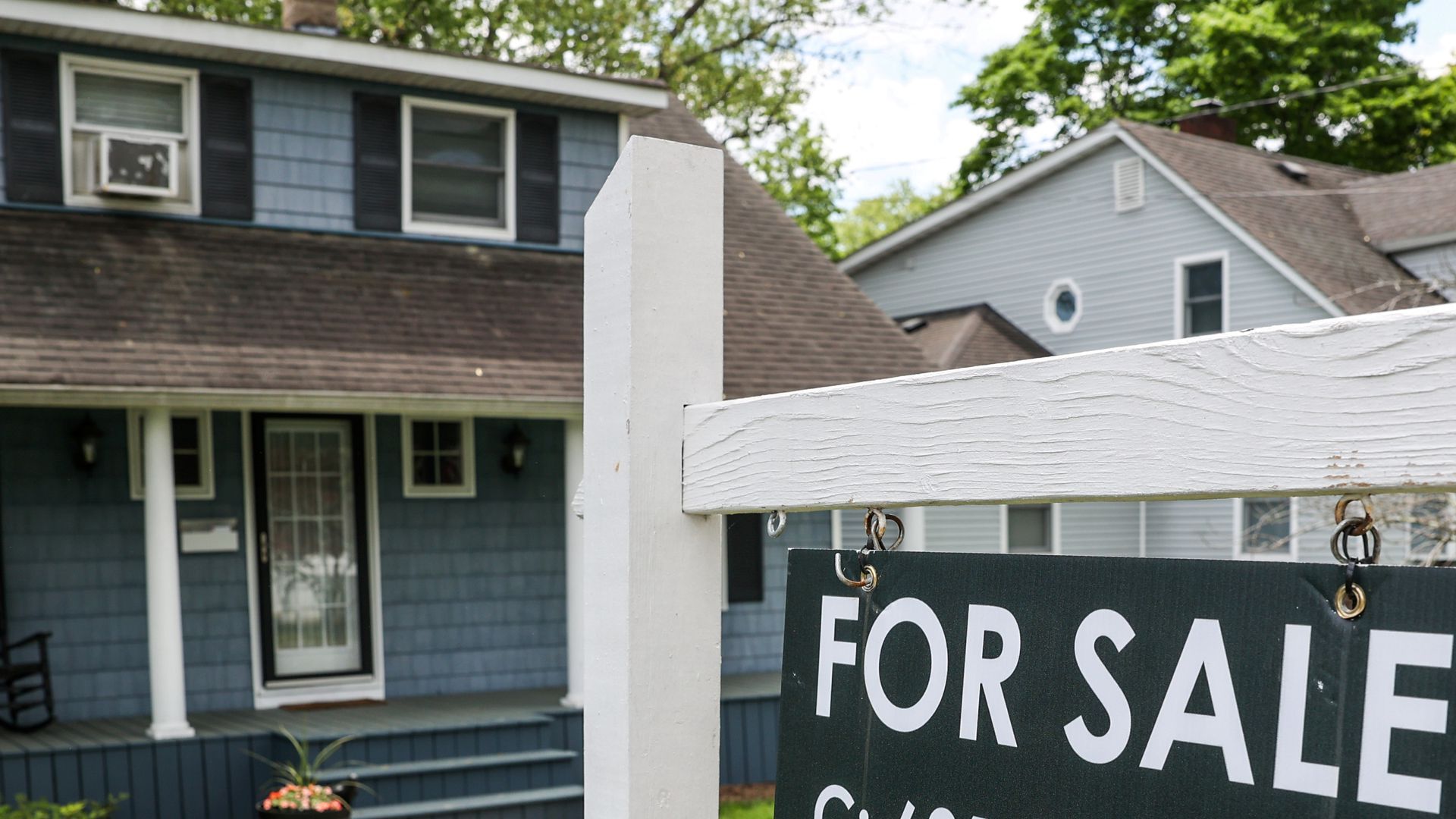| | | | | | | Presented By Giide | | | | Axios Markets | | By Emily Peck and Matt Phillips · Nov 21, 2022 | | Welcome back! ICYMI: Elizabeth Holmes was sentenced to 11 years in prison on Friday afternoon. On to the main event. Today's newsletter is 1,144 words, 4.5 minutes. | | | | | | 1 big thing: Two rail unions vote today |  | | | Illustration: Aïda Amer/Axios | | | | While everyone was paying attention to the November election, members of the country's 12 railroad unions were voting on a labor contract. The process has been a wild ride so far — and it could be headed off the rails, Emily writes. Why it matters: The two largest unions, representing about 62,000 engineers and conductors or about half the entire group, are set to announce vote results today, and the health of the U.S. economy is hanging on their yeas and nays. - The success of this deal is also a test for the White House, which brokered and sold it as a big win in September.
State of play: A no vote from either or both of these unions would raise the threat level of a strike, swinging the balance of power in labor's favor. - But even if both groups vote to ratify the deal, this isn't over. Three other, smaller unions have already voted against the contract and are now back in negotiations.
- Unlike in a lot of labor deals, pay isn't the main sticking point. It's work-life benefits — particularly sick leave.
Details: The deadline to come to terms was already moved from last weekend to Dec. 4. If one of the unions votes no today, the deadline will move to Dec. 9. - After these dates, a strike could happen at any moment — unless lawmakers step in to implement a cooling-off period or even force the workers to accept a deal.
- "Our expectation is that no matter what happens, Congress is still going to need to step in," said Scott Jensen, director of issue communications, at the American Chemistry Council. It's one of many trade groups sounding alarms about the possibility of a shutdown.
The big picture: Any disruption to freight rail service would be a blow to the supply chain recovery and the economy. - A long-lasting strike — not an impossibility — could even tip the country into recession, according to the Chemistry Council. The group projects that a month-long strike would pull close to $160 billion out of the economy, and lead to a 1% decline in GDP.
More possible and also worrying: As the December deadline creeps closer, the freight rail companies will start shutting down certain shipments — of hazardous chemicals, say — ahead of a potential strike. - For example, in the run-up to the labor deal brokered in September, the rail companies stopped shipments of all hazardous chemicals — that meant a drop of nearly 2,000 carloads of chemical shipments for just one week in September.
- Those chemicals find their way into some critical everyday necessities — chlorine, used to keep drinking water clean, as well as ethanol and ammonia, used for fertilizer.
One reassuring note: Retailers are stocked for the holidays, says Jess Dankert, vice president of supply chain for the Retail Industry Leaders Association. - "We will still have Christmas this year."
Go deeper |     | | | | | | 2. Catch up quick | | 💰 FTX businesses owe more than $3 billion to big creditors. (FT) 🎁 Americans plan to buy fewer gifts and donate less this holiday season. (WSJ) 🏥 How medical inflation is ensnaring big employers. (Axios) |     | | | | | | 3. Down and out in Hollywood |  Data: YCharts; Chart: Axios Visuals Bob Chapek is out as Disney CEO, replaced by his larger-than-life predecessor, Bob Iger, Axios Felix Salmon writes. Why it matters: Chapek always toiled in Iger's shadow. But ultimately it was Disney's down-and-t0-the-right share price that seems to have dealt the death blow. Catch up quick: Iger was reportedly unhappy about the way that Chapek became CEO in the first place. - Chapek then made missteps both with respect to Florida's "don't say gay" bill and with one of his biggest stars, Scarlett Johansson, with whom he got embroiled in a nasty court fight.
- Most recently, the company's third-quarter earnings report resulted in the stock suffering its worst one-day fall in 21 years.
The big picture: Chapek, a longtime parks and resorts executive, had little to do with Disney's new big bet — streaming. 💭 Our thought bubble, via Axios' Sara Fischer: This is one of the messiest corporate successions in recent memory. - Iger had 15 years to choose a successor and reportedly passed over candidates like former Disney executives Tom Staggs and Kevin Mayer. Now he's back to spend another two years … looking for a successor.
Flashback: In an interview with the NYT's Kara Swisher earlier this year, Iger was adamant that the idea of his becoming Disney CEO again was "ridiculous." - "I was C.E.O. for a long time," he said. "You can't go home again. I'm gone."
The bottom line: Ultimately, the failure of Chapek was a failure of succession planning on the part of Iger. Rewarding him for that failure seems bizarre. |     | | | | | | A message from Giide | | Social feed meets podcast | | |  | | | | Giide is a tool that allows you to craft more efficient and engaging content, from marketing, sales, HR, thought leadership and more. Here's how: By combining voiceover audio with clickable content, your audience can better understand your message. Get started. | | | | | | 4. More than zero |  Data: FactSet, Bankrate; Chart: Axios Visuals The Federal Reserve's campaign of interest rate increases has been kryptonite for the stock market this year. But another knock-on effect of rising rates is higher income on risk-free savings accounts — a welcome change for savers, Matt writes. Why it matters: For the last dozen years or so, rates of return on savings have been quite low by historical standards. Interest on one-year certificates of deposit was well below 1% most of the time. Now: Interest rates on savings are surging this year — the average rate on one-year CDs has risen from nearly zero to almost 2%, according to Bankrate. - Bear in mind, that's just an average. It's fairly easy to find rates online that are upwards of 4%.
- The impact: Those living on fixed incomes may see their income streams going up.
Yes, but: While 2% is better than nothing, it should still be noted that the real interest rate — which factors in the impact of inflation — on most CDs is still negative. - How that works: With inflation at 7.7% over the last year, earning 2% on savings means savers are still effectively losing money on the deal.
- But they're losing less than those keeping their cash under the mattress.
|     | | |  | | | | If you like this newsletter, your friends may, too! Refer your friends and get free Axios swag when they sign up. | | | | | | | | 5. 💬 Quoted: "Collapse in prices is coming" |  | | | Photo: Steve Pfost/Newsday RM via Getty Images | | | | "In one line: Collapse in prices is coming." — Kieran Clancy, senior U.S. economist at Pantheon Macroeconomics Why it matters: Until recently, most analysts had been saying that a tight supply of homes would likely keep home prices from falling sharply, Matt writes. Driving the news: Fresh data out Friday showed another sales drop for existing U.S. homes during October as the mortgage rate shock brought on by the Fed's hiking campaign continues to crush demand. - The nearly 6% drop in the number of homes sold in October, compared to the previous month, was the ninth consecutive decline.
What they're saying: "Inventory is now creeping higher as many previously-reluctant sellers start to worry that their home will fetch a much lower price if they continue to wait to sell," Kieran Clancy of Pantheon Macroeconomics wrote in a research note. - "Home prices have much further to fall," he added.
The bottom line: Expectations for a gentle correction in the housing market could be shifting toward a harder landing. |     | | | | | | A message from Giide | | The human factor | | |  | | | | Audiences are more likely to feel engaged with content when they can listen to someone's voice versus solely text-based content. What this means: Amid the rise of remote work, it's critical to adjust your business communications. Learn how with a demo from Giide. | | | | Was this email forwarded to you? Sign up here to get Axios Markets in your inbox. Today's newsletter was edited by Kate Marino and copy edited by Mickey Meece. |  | | Why stop here? Let's go Pro. | | | | | | Axios thanks our partners for supporting our newsletters. If you're interested in advertising, learn more here.
Sponsorship has no influence on editorial content. Axios, 3100 Clarendon Blvd, Arlington VA 22201 | | | You received this email because you signed up for newsletters from Axios.
Change your preferences or unsubscribe here. | | | Was this email forwarded to you?
Sign up now to get Axios in your inbox. | | | | Follow Axios on social media:    | | | | | |












No comments:
Post a Comment